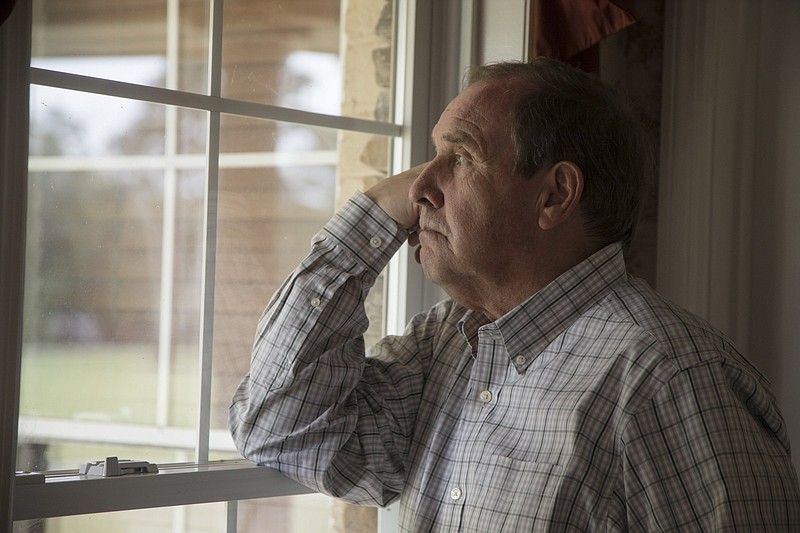Over the years, state Rep. Mike Carter's conversations with this page usually took place from his car (hands free, we're sure), somewhere on Interstate 24 between Nashville and Chattanooga.
He would patiently answer question after question or carefully explain the genesis or nuances of a bill he was trying to pass. And he could talk - liked to talk, it seemed. He wanted other people to understand why he was doing what he was doing.
Carter, an Ooltewah Republican who represented District 29 in the Tennessee House since 2012, died Saturday after a bout with pancreatic cancer. He was 67. It was a particular blow because his diagnosis last fall came just after he'd survived a harrowing case of COVID-19.
In the legislature, while some of his party members were introducing bill after bill on guns, abortion or transgender issues, he was bringing forth bills - usually with the Senate sponsorship of either Sen. Todd Gardenhire, R-Chattanooga, or Sen. Bo Watson, R-Hixson - that would affect a wider range of people.
One of those was a measure that restricted cities and town from annexing areas without the consent of those who lived there. Although the bill grew out of what he said was Chattanooga's effort to "cherry-pick" small areas of land in their urban growth boundary, it became a hit throughout the state with rural residents who didn't want their property gobbled into a city, where their taxes would increase.
Another was the effort to end vehicle emissions testing in six Tennessee counties, including Hamilton, after the Environmental Protection Agency declared those county's air within acceptable ranges. Like the annexation bill, it was a multi-year struggle, and officials only weeks ago said the word could come as soon as August to begin the wind-down on the testing centers.
Carter took his lead on the latter issue from calls he received from low-income constituents who said they were unable to afford repair after repair on their cars to pass the finicky inspection. Why continue to burden such residents, he reasoned, when the cause for the testing in essence no longer existed?
Some of his bills along the way were not necessarily "Republican" bills, and we can still hear him say, "They're" - meaning his GOP colleagues - "probably going to kill me, but ." Then, after several miles' conversation on the subject, he'd say, " but it's the right thing to do."
Other measures Carter sponsored weren't as wide-ranging, but they also came after constituents called and explained particular situations to him. What usually was occurring was happening because nobody had thought about a particular ramification in a previous law, and Carter saw how the situation might be repaired by making a small change in it.
One example was his alteration of the civil asset forfeiture law, which allowed law enforcement to seize cash and other assets from suspects. But in some cases, the suspects were never charged with a crime. His alterations in the law provided a process in which they - and others - could get their property back.
When we think of Carter, we also recall the valiant part he played in the 2019 text message scandal involving then-House Speaker Glen Casada, R-Franklin. As it played out, Carter and other members of the House Ethics Committee were called in by the committee chairman and two staff attorneys and asked to review a "statement of facts" involving Casada that Carter knew was not in agreement with "documents existing in the public realm," and they were asked to sign an "advisory opinion" that "found no ethical violation" against the speaker.
He said he would sign the document only if Casada would state under oath the facts presented were "true and correct." He was told that would not happen, so he did not sign. Subsequently, he called for Casada to resign, which he eventually did.
Carter, a Chattanooga attorney for many years, was appointed a Hamilton County General Sessions Court judge when in his mid-40s by Gov. Don Sundquist in 1997. Had he desired, he probably could have been elected for as long as he liked.
But he stepped down in 2005 for brief stop in the private sector, then went back into public service as a special assistant to then-Hamilton County Mayor Claude Ramsey. It was from that post that he ran for state representative in the redistricted 29th district, where he amazingly would be unopposed in the primary and general elections.
"It is not enough to run as a Republican," he said in a prepared statement announcing his 2012 run, "we must govern as Republicans, reassert the American dream and make it available to all citizens."
Though Carter remained and largely voted as a Republican, it was the "all citizens" part of that statement that remained at the forefront of his thinking. And the legislation he crafted with that in mind will be his legacy.
